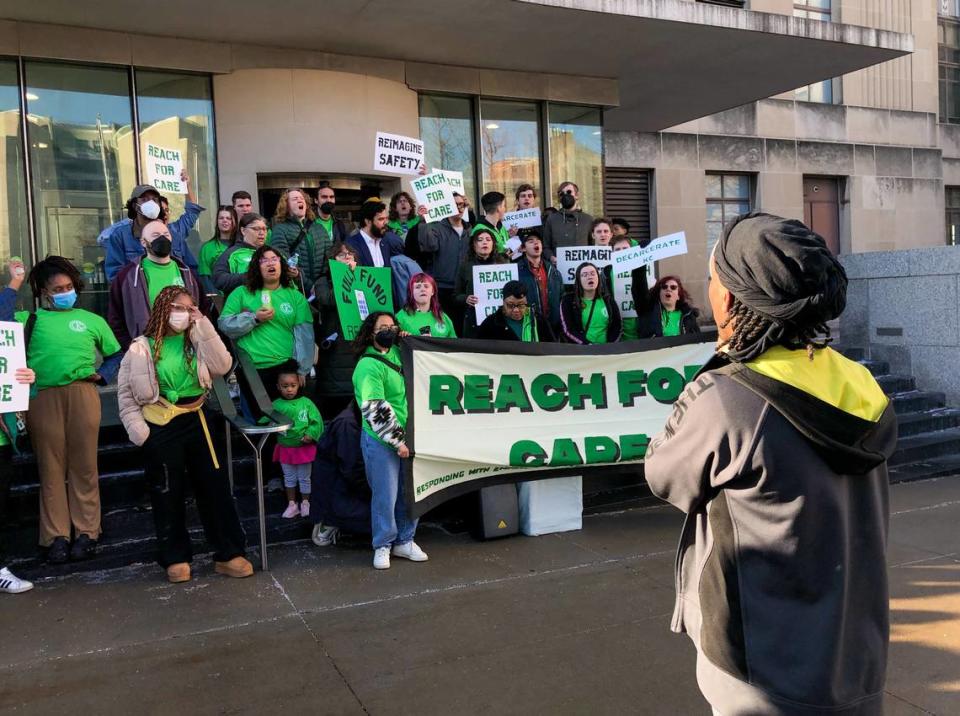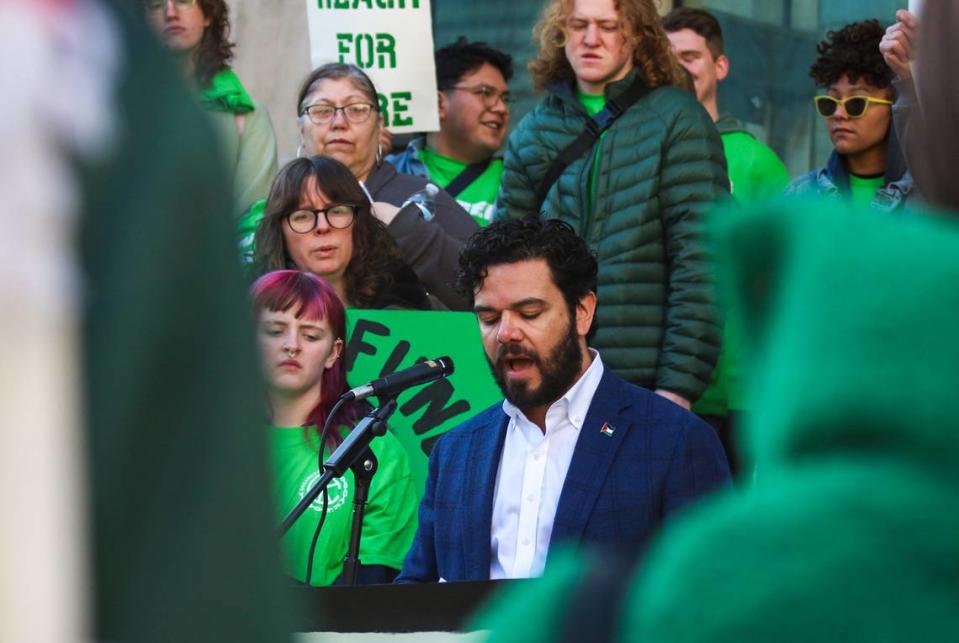Advocates call on Kansas City leaders to pass crisis response, mental health program
Holding signs and chanting “No one’s free ‘til we’re all free,” Decarcerate KC gathered on the north steps of Kansas City City Hall Saturday to call on city leaders to adopt its vision for preventing incarceration and connecting the community with better health resources.
The group introduced a plan called REACH, Responding with Empathetic Alternatives and Community Health, which would aim to help people before situations escalate to the point of arrest and jail time.
According to Decarcerate KC, the program would feature a community hotline that would divert eligible 911 calls to alternative response teams. Those alternative response teams, the group said, would be equipped to connect people to resources like housing, mental health and social services in hopes of meeting needs before police become involved.
In front of City Hall Saturday, the group wore matching green shirts with the words “we keep us safe” on the backs. In between speakers, the group hit a drum and cheered and chanted.
Nadra Barnes, a member of Decarcerate KC, shared her testimony about being incarcerated. Barnes said after her mother died from breast cancer, she became depressed and made poor decisions.
“If I had a positive presence and helpful place to turn, my outcome, it would have been a lot different for me,” Barnes said. “But instead, I was incarcerated.”

“That’s why I’ve taken a stand to have REACH become a reality for others to get the suppport they need when they find themselves in their dark place,” she said.
The group argued that REACH would serve as a way to meet people’s needs in the community before a lack of support leads to poor decisions which can lead to incarceration.
Kero Laveli, a leader of Decarcerate KC, said he has been meeting with members of the Kansas City City Council and other city staff about the group’s vision for the new non-police community response and pre-arrest diversion program.
“This program would be the first of its kind in Kansas City,” Laveli said. “It would create community health programs and response teams within Kansas City’s health department in order to connect people with resources they need instead of sending them to jail.”
He said REACH would work in three steps to divert people from jail time:
Kansas Citians can choose to call 311 to request a REACH community response team instead of police.
Community responders provide that alternate response, deescalate situations if nee -ded, and connect people to a diversion office where they will receive individualized care.
Care navigators will work with people to address immediate needs like food, clothing, water and long-term needs like mental healthcare.
Legislation for the REACH program will be introduced to the Kansas City City Council at its regular meeting March 7. One of the City Council members Laveli had spoken with about the program, 6th District Councilman Johnathan Duncan, was in attendance at the rally.

“I’m proud to be the champion of this ordinance,” Duncan said. “I’m here this morning before our budget meeting because our budget is a moral document; we fund what we value. ... And we should be funding our people.”
Duncan said REACH would help Kansas City’s most vulnerable residents get the help they need and eliminate a “costly and inhumane cycle” of punishment.
“For far too long, here in Kansas City and in many cities across our nation, we have failed to fund systems of care and instead have funded systems of punishment,” Duncan said.
At the rally, Duncan said he will introduce legislation next week for a “proactive public safety initiative” that will aim to address these issues in Kansas City.
The legislation, he said, is based on recommendations from the city’s Commission on Incarceration Alternatives and will model practices from cities like Atlanta and Denver for non-emergency services, like someone experiencing a mental health crisis or someone sleeping on the street.
Duncan said the city’s Commission on Incarceration Alternatives provided testimony and recommended the REACH program to the Rehabilitation and Detention Facility Committee, of which Duncan is a member.
“This legislation will reduce our call volume for our 911 dispatchers, it will lighten the load for our police,” Duncan said. “It will help our small business owners who often bare the brunt of these issues, and break the vicious cycle so many of our most vulnerable residents are trapped in.”

